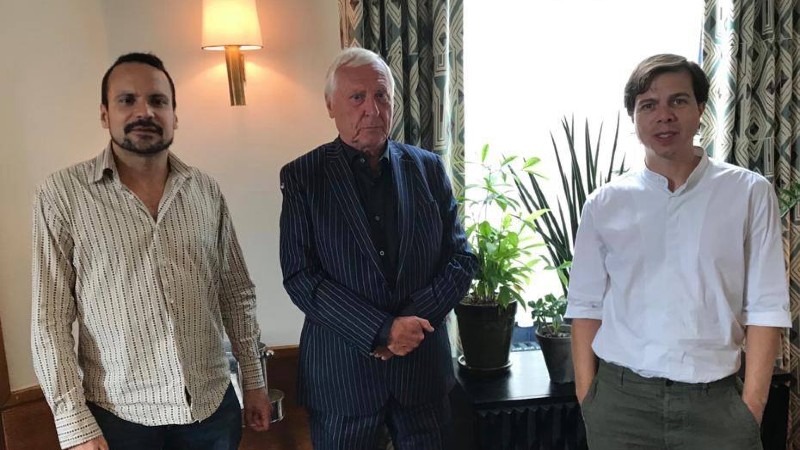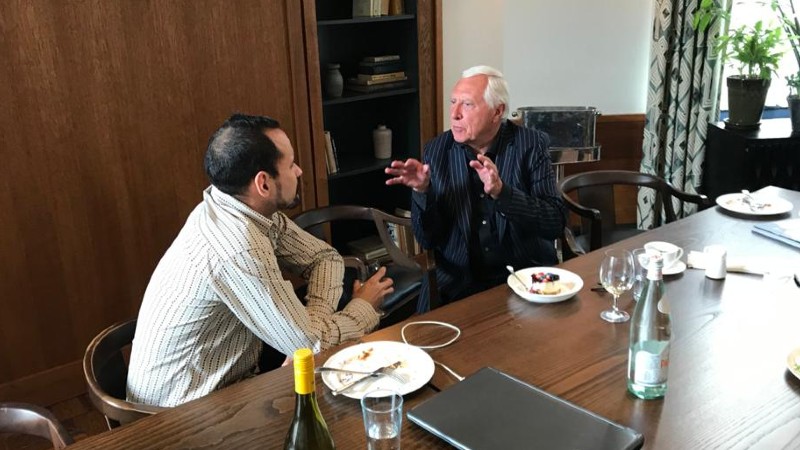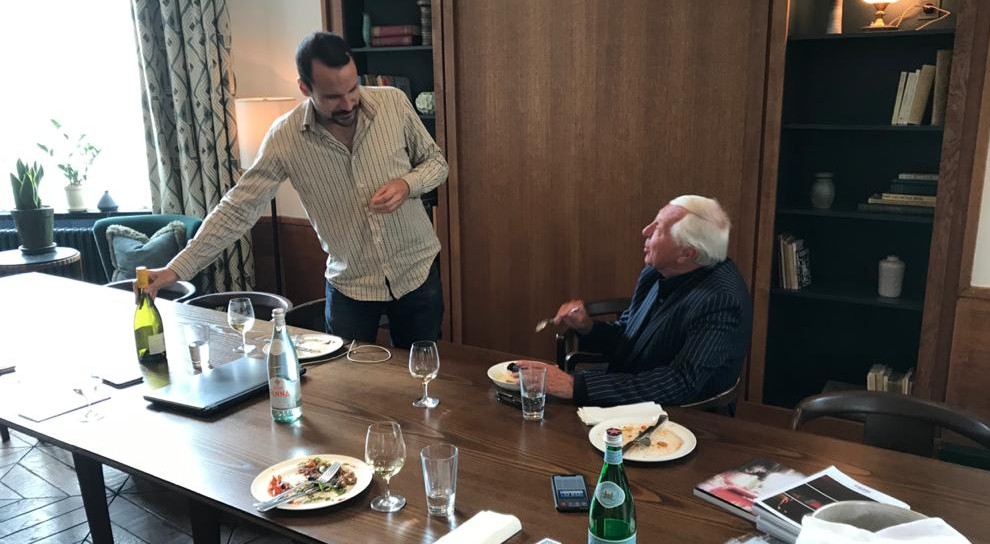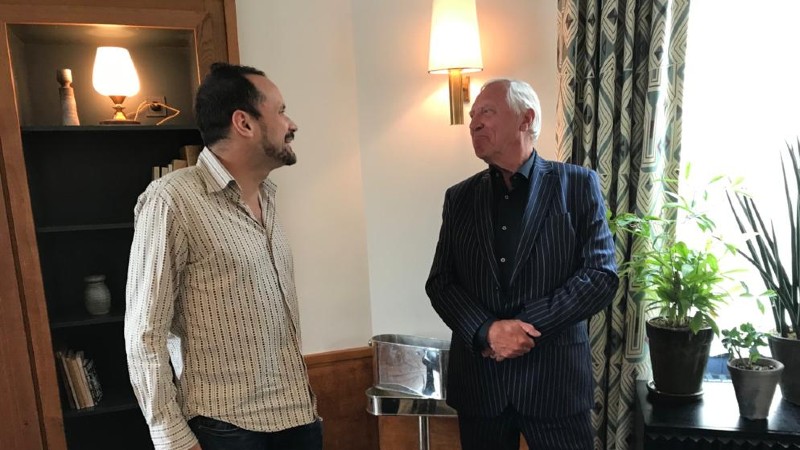




























































Asking Peter Greenaway to adhere to my script was never going to be a simple task. The 78-year-old British has penned every single one of the films of the past five decades, so it’s hardly surprising that he should wander in every direction at his will upon answering the neat questions that I had prepared for him. “Although I’m supposed to be a picturesmith, all my scripts – and I’ve made 60 films – are always my films”, he ascertains emphatically. All of his films are written and spoken in complete, elegant, literary sentences.
Despite his superb writing skills, Greenaway often describes his films as “non-narrative” and after nearly three hours interviewing and chatting with him in a private dining room of Soho House in Amsterdam, I can ascertain that the non-narrativeness extends to the filmmaker himself. Our conversation does not move forward in a linear fashion. He is well aware and jokes about it. “We are hopping from topic to topic like a kangaroo”.
Alex and I traveled to Amsterdam in order to interview the iconic filmmaker (the three of us are pictured just below). I am the founder and editor of DMovies, one of the leading independent film publications in the UK. Alex is the founder and Editor-in-Chief of the nascent film & fashion mag Doesn’t Exist. In addition to working together, we have been good friends for more than 10 years.
Our trip to Amsterdam took place in July 2020, just after the first Covid-19 wave ended, travel restrictions between the UK and the Netherlands had been relaxed and we no longer had to go into self-isolation for two weeks upon our return. The virus of course wasn’t gone and an understandably cautious Peter asked to be alone in the room with us, and the food had to be prepared in advance (so we didn’t have to share the space with other guests and waiters). Peter was far less restrictive about the meal itself. I had asked him days earlier on the telephone about dietary restrictions, to which he swiftly replied: “I eat anything, even human flesh”. Strangely, he skipped the visceral, ensanguined gazpacho starter and tucked into the far more mundane chicken and pasta main, wrapping it all up with a heavenly cheesecake. All washed down with white wine, which he actively requested.
.
Beyond film
Peter does not like being described as a filmmaker, preferring the “artist” accolade instead. In the past two decades, he has progressively veered away from the seventh art (which he proclaims to be “dead”) in favour of pastures green: multimedia installations, exhibitions, painting and drawings. In fact, Peter started out as a painter, and he’s still very fond of it: “I think painting is the most important thing that exists on the planet”. He goes further, evoking biblical references: “How can Adam go out into the world as God-commanded and name everything unless there is something to name? So in the beginning was the image. And I think it stands for all of our culture.“ Peter Greenaway’s movies are as close as you will ever get to a motion painting, complete with music, dialogues, textures and smells. A hybrid blend of Brecht and cubism: viewers are alienated, while the narrative is broken down into asymmetrical yet digestible bite-size pieces.
Peter attended art school in London in the swinging 1960s, with the likes of Keith Richards and Ian Drury. None of the people he studied with became painters, but instead fashion designers, filmmakers and such. Peter eventually dropped the brush and the pencil in favour of the movie camera as his weapon of choice. He worked for the Central Office of Information creating short films for the British government. He describes the organisation as “Russian politburo” that created “propaganda”. He talks about a movie assignment about malaria and another one about milk. He confesses that he was a keen Marxist back then, and cut all materials for the Socialist Party. He then notes “I am not as politically active now as I was then”.

.
A European love affair
Amsterdam has been home to the British director for 26 years. One year for each letter of the alphabet. He’s married to the Dutch multimedia artist Saskia Boddeke. He has Dutch children, including a daughter who wants to become the editor of American Vogue. His relation with the Netherlands (a country he prefers to call “Holland”) started in his early years as a painter, perhaps because he didn’t think very highly of English painters (“I bet you couldn’t name three or four English painters who have been transported around the world”). His first feature film The Draughtsman’s Contract was made in 1982 (he does not consider his earlier mockumentary The Falls, from 1980, to be a feature film), and it already included references to the Netherlands, with Dutch shortly spoken in one of the dialogues. This film changed his life because it attracted the attention of his lifelong producer Kees Kasander, who of course happens to be Dutch. “He said that he would look after my career, provided that I didn’t go to Hollywood”. I can’t picture Greenaway living the glitzy life on a Californian hill. He looks far more comfortable in the Dutch capital, brimming with historical painters, designers and philosophers.
His relationship with Britishness is a tricky one. Despite being born in Newport, in Southern Wales, Peter often describes himself as English. All of his films are spoken in English and I’m not entirely sure of his fluency in Dutch. He explains it: “England has always regarded itself as a literary nation. Shakespeare virtually created the English language. Most of the time I speak, without even knowing it, I’m quoting Shakespeare”. And he hates Brexit: “It was a terrible, terrible mistake. I got children. They are universal, they are Europeans. A couple of years ago I decided to stay European, so I got my Dutch passport. Even if the UK disappears, I’ll still be a European”.
.
Playing with language
An auteur. A provocateur. A titillator. A taboo-breaker. There are many ways of describing Peter Greenaway. I think he’s comfortable with any of these badges, and many others. He likes playing. Narrative play, visual play, numeric play, sexual play. He also enjoys toying with language: wordplay. Pillow Book is all about Japanese characters printed on the human body (particularly on Ewan MacGregor’s character Jerome), in every private nook and cranny. In Goltzius and the Pelican Company he ascertains: “God is dog spelled backwards”. He is fascinated by foreign words with multiple connotations. He asks me: “do you realise that the French don’t distinguish between heaven and sky, they just call it ‘ciel’?”. He then challenges me, aware of my Brazilian origins: “Do you have such an example in Portuguese?”. I reply: “we don’t distinguish between fingers and toes. In Brazil, we all have 20 fingers”. He seems genuinely interested in my answer.
Peter is neither waspish nor unpleasant, but instead passionate and affecting. His tone is never retaliatory. His rhetoric is indeed spiced with both recognisable and obscure citations, and the outcome can be a little elliptical and esoteric, even if you are very familiar with his work. Check out the long version of the interview on the print edition of Doesn’t Exist for more juicy bits.
There is no regular flow to our conversation, but instead a complex patchwork of painting, film, fashion and music references. Peter passionately navigates from one topic to the next without telling a story, without closure. From Vivianne Westwood to Stendhal Syndrome and Calvinism, often in the same sentence. He often interrupts me before the question is finished and veers in a completely different direction, without being rude and dismissive. His enthusiasm is such that he loves repeating words: “My sense of identification with the UK is getting less, and less, and less”, “the Greek were concerned about death years and years and years ago” and his favourite “Etc, etc, etc”. Peter isn’t being vague. It’s just that he’s just heaving with knowledge and ideas of his own. My head spins vertiginously intoxicated by the abundance of intertext and the wealth of references.
Being non-narrative does not mean being disjointed. Peter’s films are structured upon various systems, both numerical and alphabetical. Peter is entertaining, and his commentary punctuated with sharp and witty remarks, provocative banter and very peculiar anecdotes. He too seemed to enjoy the time he spent with us, often asking questions and sharing his very provocative views on various topics without reservations about the menacing recording devices in front of him.

Engaging with Peter is a visual experience, just like his movies. He is hypnotic to watch: his gaze firm and magnetic, his attire elegant, his body language subtle yet unambiguous. He dons a black striped suit, which he has worn for many other interviews in the past (“look at me, dressed like a Chicago Gangster!). He refuses to say where he got it from. At times, he gesticulates with his hands in good ol’ Italian style. How un-British!
.
Playing games
Peter has authored 15 feature films plus countless documentaries and short movies. He has also directed a handful of mockumentaries (such as The Falls, from 1978). The line between fiction and truth is increasingly blurred. “I don’t think there’s much difference nowadays between documentary and feature film”, he explains. I often wondered whether this extended to our conversation: did Peter make up some of his answers? Was he pulling my leg when he denied he ever planned a trilogy of Dutch masters (something broadly publicised in the media)?
He enjoys the freedom to change his mind and to toy with reality: “I think that game-playing is a very, very serious occupation”. He thinks that this also applies to journalists: “Creative journalism. I’m sure you’re gonna do it too”. Is he giving me carte blanche to reinterpret and reimagine his manifold myths and anecdotes? He does seem to trust me.
On the other hand, the artist doesn’t like being confronted with his own past remarks. A grumbling Peter rolls his eyes upon being reminded of an old quote about the remote control spelling the death of cinema: “Look, I don’t have to think this now, this is what I thought last week”. I retort: “Absolutely. You are entitled to disagree with yourself. And we’d love to hear that”. He smiles back and finally gives us a long answer blending wallpaper, Hitchcock, and Marilyn Monroe’s knickers.
.
Dirty talk
I ask that we talk dirty. Peter is delighted: “If we are going to talk about sex and death nothing else is important. Balzac suggested that money was important, but money hasn’t been around for very long, has it?” Sex and death are prominent topics in every single one of his 15 feature films. Nudity is abundant, particularly male nudity. Sex is highly is pompous and conversational – such as the adulterous protagonists of The Cook, The Thief, His Wife and Her Lover (1989) or the bizarre love triangle of A Zed and Two Noughts (1985) – and rarely sweaty. This is different from being anti-erotic. Despite the loquaciousness, sex is beautiful and pleasurable in Peter Greenaway’s movies. He is dismissive of the filmmakers who portray the actual coitus: “In [Nicolas Roegs’s] Don’t Look Now (1973), the two characters, about them having real sex, it’s just game play, propaganda to distribute the film”.
Nine years ago Peter told the Guardian that he planned to kill himself when he turned 80. That’s in less than two years from now. So I gently poked him: “You wouldn’t dare to die before Jean-Luc Godard, would you?”. He no longer seems to contemplate suicide but instead wants to allow nature to take its course: “the average age of death even for foreigners in Holland in 84, so if I’m lucky if I have five more years, I’m very conscious of that”. There is a reason why Peter sees little purpose in living past 80: “Did you see the last 10 films of that Portuguese filmmaker who died at 107?”, he asks me, referring to the late Manoel de Oliveira. He carries on: “There are one or two good prints by Picasso he did aged 82, the two most famous paintings by Titian Tiziano he did aged 84. Don’t worry, I have done all the research, I’ve worked it all out. But there are very few works of great significance done by anybody over 80.”

.
Random fragments
Our conversation was peppered with random and very entertaining anecdotes of all sorts. He talked about the day he took Vivianne Westwood to the Rijkesmuseum of Amsterdam in order to see Rembrandt’s The Night Watch and she started giggling uncontrollably, and staff – unaware of who the eccentric lady was – asked him to take her out of the room. Or the day David Cronenberg “grilled” him in a bar in Hamburg before he went on to make his very own version of A Zed and Two Noughts (incidentally, Peter Greenaway’s personal favourite film by Peter Greenaway, and also mine), and named it Dead Ringers (which became a much bigger hit, starring Jeremy Irons), in 1988.
Naturally, we also talked about music: “Unfortunately I cannot write music. But I do everything else”, he said. Peter Greenaway and his long time composer Michael Nyman were inseparable for 15 years. Like two human legs. I told him that Drowning by Numbers (1988), Prospero’s Books (1991) or any of his early movies would be an amputee without Nyman’s collaboration, similarly to Andrea Ferreol’s character in A Zed and Two Noughts. Peter is far less fatalistic: “They also said that about Sasha Vierny, Alan Resnais’s cameraman, who also worked with Bunuel. And they said there would be no Peter Greenaway without Vierny. But most marriages end in divorce”. And he is right, having worked successfully with other composers since. The Pillow Book, his first film without Nyman, had a surprising soundtrack blending French experimental music and Buddist chants with Mozart and U2. Peter Greenaway is no one-man man.
.
Film & fashion
Then we talked about fashion. At first, Peter was reluctant to answer my question about the role costumes play in his films, and whether these clothes have a life of their own. He kept drifting off-topic, talking about paintings and Rolls Royces instead. Until he finally erupted, referring to his experience with Jean-Paul-Galtier in The Cook, The Thief. He asked the French fashion designer to incorporate a whole series of paintings from the Eighty Years War between Holland and Spain into the movie. “I organised the painting space as a cinema space with the camera man to be a pastiche of a civil war painting”, he explains.
.
Acquired taste in film
We also talked about Peter’s surprising taste in film. He’s not a huge fan of some of the most important non-narrative movies ever made. He described Tarkovsky’s Mirror (one of my favourite films of all times, and the one that inspired me to create Dirty Movies) as “extremely boring”. Similarly with Godard’s The Image Book (2018). He believes that these films fail to enrapture viewers: “I certainly believe in the pleasure principle. You have to entertain. The Roman architect Vitruvius said: a very great work of art has to be 50% entertainment and 50% instruction”. He is far more generous about Alain Resnais’s Last Year in Marienbad: “Many people find it to be pompous, wholly intellectual, etc, etc. But that’s the closest a film ever got to non-narrativity in a way”. He is also a fan of far more linear, mainstream cinema: he showers Blade Runner and Gladiator (Ridley Scott, 1982 and 2000) with praise: “Very Hollywood films, but extraordinary, amazing visuals. An amazing imagination”. He laments that his countryman is not counted amongst the greatest directors of all times: “he’s highly respected. but he’s not not up there in the great echelon of filmmakers”.

.
Before Peter dies…
Peter shared the details of his various upcoming projects. He’s finishing off his upcoming feature film about the Romanian sculptor and painter Constantin Brancusi, Walking to Paris. He’s also working with Morgan Freeman on his following feature film, Lucca Mortis, about an African-American GI soldier who makes an Italian girl pregnant in the titular Italian city (which is also the birthplace of Puccini). “It’s all about death, but it’s not a zombie movie”, he sums it up. He also intends to do another two movies about Eisenstein, and that’s primarily because he enjoyed working with the Finnish actor Elmer Back in Eisenstein in Guanajuato. There’s also a movie about Austrian expressionist Oskar Kokoschka and his sex doll of Alma Mahler. He intends to call the movie The OK Doll (in reference to the artist’s initials). His upcoming non-filmic endeavours include an opera of his most successful movie, The Cook, The Thief, His Wife and Her Lover. Sadly Michael Nyman has already turned down his invitation to take part in the project. Peter sounds very forgiving of the English composer: “I can understand him completely”. There are so many projects that he’s guaranteed not to complete them before the age of 80. “It takes a human gestation period, nine months, to make a film. So if I’m very quick, I don’t know whether I’ll get through it all”. We all look forward to seeing the babies Peter is still to father. We hold no prejudice against octogenarian parenthood.
…
.
In order to read the long version of the interview with Peter Greenaway, including the various anecdotes, peculiar snippets of history and philosophy, witty remarks, dark gags, eccentric antics combined with a thrilling visual journey, you have to buy the impressive second edition of the fabulous film & fashion magazine Doesn’t Exist.






